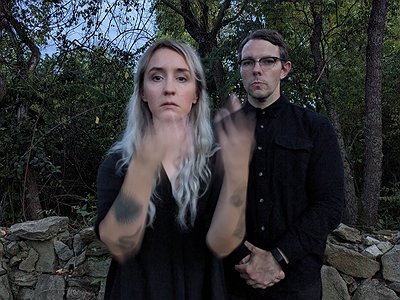Name: Samantha Marandola,
Occupation: Singer, songwriter
Nationality: American
Current release: Oldest Sea's debut album A Birdsong, A Ghost is out now.
If you enjoyed this Samantha Marandola interview and would like to find out more about her music and Oldest Sea, visit the band on Facebook, and bandcamp.
Do you think that some of your earliest musical experiences planted a seed for your interest in your voice and singing? How and when did you start singing?
Yes my childhood was filled with whatever music my parents and/or older siblings listened to. I had so much exposure to so many different kinds of music and voices.
I've been singing ever since I can remember.
If you're also playing other instruments, how does the expressive potential of these compare to your own voice?
I play a lot of different instruments. But vocals are what allow me to really deeply express myself.
What were some of the main challenges in your development as a singer/vocalist? Which practices, exercises, or experiences were most helpful in reaching your goals – were there also “harmful” ones?
Recently I started writing songs in Standard A tuning, which is pretty low for my voice.
It was definitely a learning curve to explore the deeper tones of my voice, but I now prefer singing in a lower key.
What are the things you hear in a voice when listening to a vocalist? What moves you in the voices of other singers?
I think what moves me in the voices of other singers is usually an intangible thing.
For instance, Jason Molina’s voice has the ability to bring me to my knees, but I can't really explain why. It's as if his voice has always existed throughout eternity.
How would you describe the physical sensation of singing? [Where do you feel the voice, do you have a visual sensation/representation, is there a sense of release or tension etc …]
For me, singing is a cathartic release.
After I sing an especially intense song, I feel like I just had a good cry.
What kind of musical settings and situations do you think are ideal for your own voice?
Anywhere where I can actually hear myself in the monitor is always good. A hot beverage also helps.
We have a speaking voice and a singing voice. Do these feel like they are natural extensions of each other, ends on a spectrum or different in kind?
If I think about singing as a natural extension of speaking, it actually helps me to relax more and sing my best.
From whispers to screams, from different colours to dynamics, what are the potentials and limits of your voice? How much of your vocal performance can and do you want to control?
I think right now the only limit is that I can't sing as high as I used to, which is fine. I've also developed a bit of a rasp when I project, and I actually really like that.
The vocals I wrote have grown increasingly more dynamic, but I like challenging my voice and expressing it through different volumes and textures.
When you're writing song lyrics, do you sense or see a connection between your voice and the text? Does it need to feel and sound “good” or “right” to sing certain words? What's your perspective in this regard of singing someone else's songs versus your own?
I adjust my volume depending on the mood of the line from a song or even just a single word.
Strain is a particularly serious issue for many vocalists. How do you take care of your voice? Are the recipes or techniques to get a damaged voice back in shape?
I rest my voice as much as possible in between performances. I also drink a lot of room temperature and warm beverages.
A healthy diet makes a big difference too.
How has technology, such as autotune or effect processing, impacted singing? Has it been a concrete influence on your own approach?
I always appreciate imperfections in the voice, so I'm not a huge fan of auto tune. I don't use it myself.
For recording engineers, the human voice remains a tricky element to capture. What, from your perspective, makes voices sound great on record and in a live setting?
So many things go into making a voice sound great: the equipment used, the effects/lack of effects, the mixing, the EQing, etc.
Motherese may have been the origin of music, and singing is possibly the earliest form of musical expression, and culture in general. How connected is the human voice to your own sense of wellbeing, your creativity, and society as a whole?
I'll reiterate that singing is very cathartic for me. It's an expression of who I am and part of how I make sense of existence.




